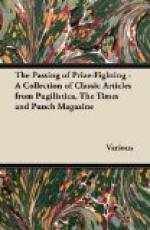* * * * *
“At St. Peter’s, Vere Street, where he is going to preach from the 30th of this month to the end of this year, the Rev. R.J. Campbell will speak from the pulpit of Frederick Denison Maurice, like himself a convert to the Church of England ... To hear him was an experience never forgotten.”—Guardian.
And this although MAURICE rarely preached for more than one month on end.
* * * * *
[Illustration: MANNERS IN MACEDONIA.
LADIES FIRST.]
* * * * *
OUR BOOKING-OFFICE.
(By Mr. Punch’s Staff of Learned Clerks.)
I can’t help thinking that Gyp, the central figure in Mr. JOHN GALSWORTHY’S new story, Beyond (HEINEMANN), was unhappy in her encounters with the opposite sex. But if memory serves me this is an experience familiar to Mr. GALSWORTHY’S heroines. Men were always wanting to kiss Gyp, or to marry her, or both, and after a time kept going off and repeating the process with somebody else; so that one can’t fairly be astonished if towards the end of the book her outlook had become rather cynical. The character who might have preserved her estimate of mankind in general, and the best and most sympathetically drawn figure in the book, is Gyp’s perfectly delightful old father, who throughout the conspicuous failure of her two unions, legitimate and other, retained his fine and chivalrous regard and unfailing care for a daughter who might well have been a thorn in the flesh of a conventional parent. But the relations of these two were never conventional. Gyp had been herself a love-child, and the knowledge of this is shown very clearly in its influence upon their mutual attitude. As for her own affairs, these were, first—to her father’s unbounded astonishment—marriage with a temperamental violinist, who ran rapidly down the scale from adoration of his own wife to intrigue with another’s; second, clandestine relations with a man of her own race and breed, who loved her to idolatry, and within a few months was found embracing his cousin. Poor Gyp! I jest; but you will need no telling that for sincerity and beauty of writing here is a book that you cannot afford to miss. Sometimes I am a little uncertain what Mr. GALSWORTHY is driving at, but I never fail to admire his drive.
* * * * *
Unless Mr. S.P.B. MAIS learns to curb his enthusiasms and to rid himself of certain prejudices he will be wantonly seeking trouble. Rebellion (GRANT RICHARDS) is in some respects a more thoughtful and promising book than Interlude, but it is marred by what can only be called the same narrow point of view. With everybody and everything modern Mr. MAIS shows an ardent sympathy, but if he is ever to give a comprehensive picture of life he must contrive




